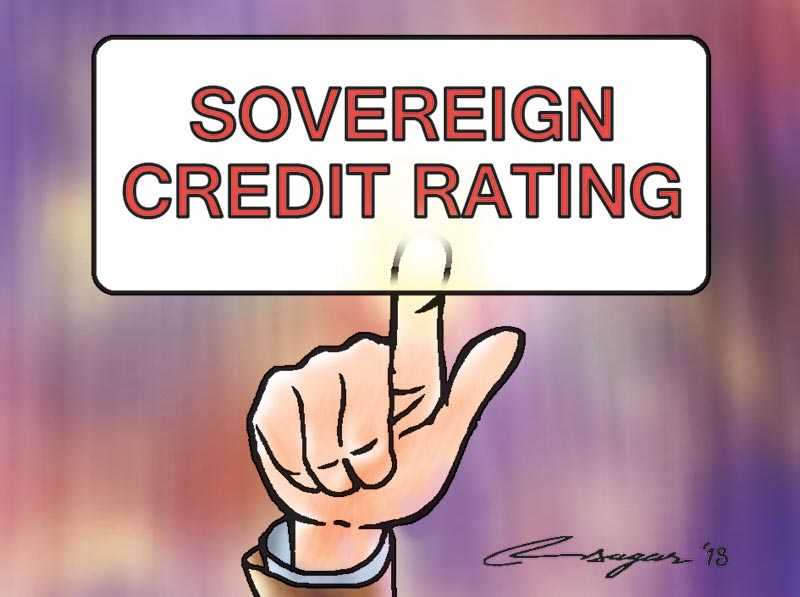Sovereign credit rating : Why is it important for Nepal?
We strongly believe that obtaining a credit rating will greatly benefit the country’s international credit story while having positive ripple effects on the broader economy. It improves market efficiency and lowers costs for borrowers and investors
The National Planning Commission (NPC), the apex advisory body of the Government of Nepal for formulating a national vision, periodic plans and policies for development, estimates funding of USD 17.5bn is required annually till 2030 for Nepal to achieve Sustainable Development Goals (Development Goals – Status and Roadmap: 2016-2030 - NPC, Government of Nepal, December 2017).
Current levels of Official Development Assistance (ODA), domestic resources and international investment towards SDGs will leave a gap of 12 per cent of the gross domestic product (GDP), requiring action from other stakeholders including the private sector.
Whilst there are several ways to overcome this funding gap, somewhere these elements are all connected with the maturity of domestic financial infrastructure, transparency, rule of law and access to international capital flows.
A strong metric which captures the risk versus reward trade-off of doing business in a country is its sovereign credit rating. By definition, a sovereign credit rating is the credit rating of a country or sovereign entity. Sovereign credit ratings also provide investors with the insight into the level of risk when it comes to investing in a particular country, including political risk. At the request of the country, a credit rating agency will evaluate the country’s economic and political environment to determine a representative credit rating. Obtaining a good sovereign credit rating is usually essential for developing countries in order to access funding in international bond markets.
We strongly believe that obtaining a credit rating will greatly benefit the country’s international credit story while having positive ripple effects on the broader economy. Generally speaking it improves market efficiency and lowers costs for both borrowers and investors. In specific, firstly it Improves Nepal’s international profile as sovereign rating acts as a benchmark that can enhance private and public sector access to the global capital markets and help attract foreign direct investment (FDI) and Credit rating can help support Nepal’s ongoing economic and financial reform efforts. Secondly, it enhances Nepal’s ability to access global capital markets, as continuous access to capital markets during periods of stress is enhanced for issuers possessing an international credit rating and a rating is key to achieving the optimal pricing within the capital markets; significantly enhancing both primary and secondary market liquidity. Thirdly, it has broader investor acceptance, for the sovereign rating and country ceiling are key inputs for international banks and investors in setting the terms of exposure to Nepal, including local bank and corporate counterparties.
FDI is an important source, and empirical findings show that there is a statistically significant relationship between FDI and sovereign rating. All neighbouring countries of Nepal have a credit ratings and are progressing on well directed action plans to improve their investment climate. Simply expressed, higher-rated sovereigns enjoy cheaper and more diversified funding sources and lower-rated and unrated sovereigns have a higher proportion of foreign direct investment. Similarly, higher ratings help develop domestic capital markets and channel domestic savings into the market. Higher ratings are also linked to improved transparency and a more predictable legal framework, which attracts greater capital inflows.
The financial sector in Nepal, though nascent, is growing steadily and commercial banking is now a mature sub-sector.
Specialised term lending institutions such as Jalvidhyut Lagani Tatha Bikas Company Ltd, or Hydropower Investment and Development Company Ltd (HIDCL), and Infrastructure Bank will widen sectoral engagement and deepen credit appetite. This journey to market maturity would include growth in capital markets, both primary and secondary; followed by the influx of private equity and other socially responsible investors as Nepal gets increasingly coupled with the rest of the world.
We expect the shift from simple bank led finance to market driven financing options will ultimately ensure cheaper funding cost and more efficient resource utilisation along the risk reward trade-off curve.
Country ratings have other spin off benefits and one key learning is that we should incentivise and motivate domestic financial intermediation as much as possible to reduce the need for foreign hard currency based funding which sometimes looks cheap and easy to do but has currency and credit risks attached to it. This requires policy changes to deepen capital markets -- in nurturing both primary and secondary markets.
Active secondary bond market will encourage institutions to issue rated debt instruments and active trading will help establish transactable yield curve of NPR thereby helping market to rightly price the long term assets and liabilities. This will also help to price the foreign exchange (FX) hedges and area that will de-risk longer term projects that have a large foreign exchange component.
The Government of Nepal should study the emerging situation, access horizon risks and decide the appropriate time and approach to commence the process of getting a sovereign credit rating.
Silvanus is chief executive officer, Standard Chartered Bank Nepal Ltd






